The Synology DS923+ is a powerful and expandable NAS solution that is designed for home offices and small businesses. Equipped with the versatile Synology DiskStation Manager (DSM) operating system, it offers a range of features that help you protect, manage, and collaborate on your business data.
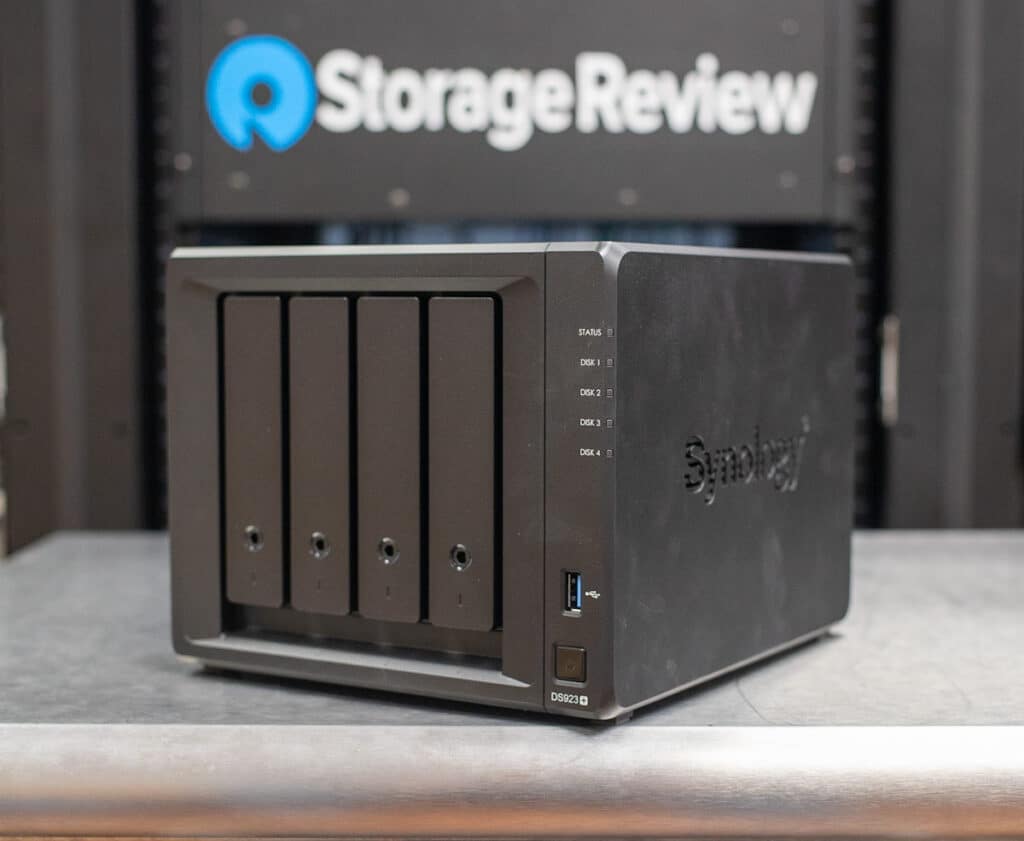
What differentiates this NAS from other 4-bay solutions in the Synology portfolio is its ability to scale with your needs. The 4-bay DS923+ can be easily expanded to accommodate another 5 bays with the addition of a DX517 expansion unit. This lets businesses start small and expand as needed, without having to buy a new NAS.
For those with a performance need, the Synology DS923+ can move past the onboard 1GbE connections by upgrading to 10GbE networking. The 10GbE NIC is a proprietary Synology design, but it is tiny and installs in a few seconds, requiring the removal of two screws. We have an install video and a deeper look at the Synology 10GbE NIC.
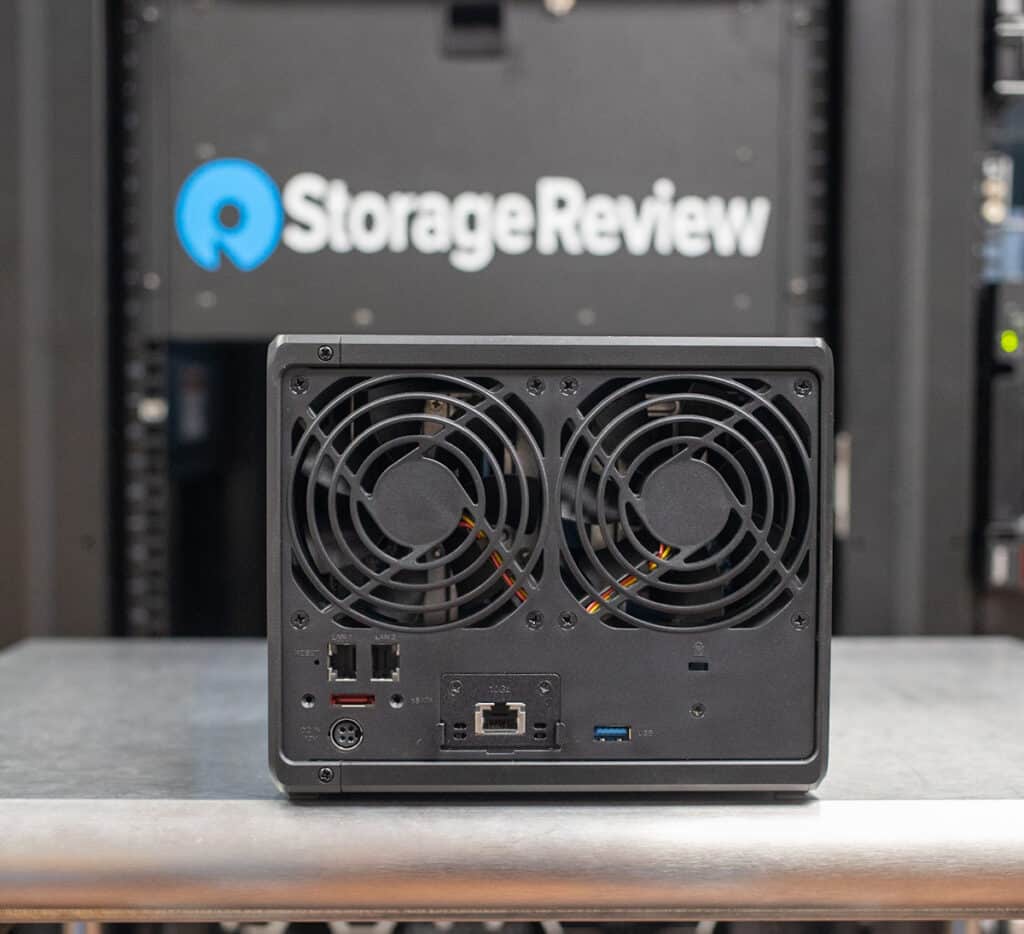
One of the most notable changes in the DS923+ specifically is Synology has added support for flash poos for the M.2 NVMe SSD drives. The DS923+ has two built-in slots on the bottom of the chassis for NVMe SSDs. The rub however is this feature only supports Synology SSDs which are limited in capacity and at this time, this feature only works on this NAS.
The Synology DS923+ carries a street price on Amazon of $599 diskless.
Synology DS923+ Specification Highlights
| Hardware Specs | Software Specs |
|---|---|
| CPU Model | AMD Ryzen R1600 |
| CPU Quantity | 1 |
| CPU Architecture | 64-bit |
| CPU Frequency | 2-core 2.6 (base) / 3.1 (turbo) GHz |
| Hardware Encryption Engine (AES-NI) | Yes |
| System Memory | 4 GB DDR4 ECC |
| Memory Module Pre-installed | 4 GB (4 GB x 1) |
| Total Memory Slots | 2 |
| Maximum Memory Capacity | 32 GB (16 GB x 2) |
| Drive Bays | 4 |
| Maximum Drive Bays with Expansion Unit | 9 (DX517 x 1) |
| M.2 Drive Slots | 2 (NVMe) |
| Compatible Drive Type | 3.5″ SATA HDD, 2.5″ SATA SSD, M.2 2280 NVMe SSD |
| RJ-45 1GbE LAN Port | 2 (with Link Aggregation / Failover support) |
Software Benefits for Business
Synology is popular in large part because of its software. DSM is very easy to configure and use, and Synology offers a very deep set of applications that can be installed with a click. In addition to third-party apps, Synology also offers a deep set of its own, to support a number of business use cases like:
- Synology Drive allows you to access and share files remotely while still maintaining the privacy and ownership of on-premises storage. The also includes Synology Hybrid Share, which stores cold data in the cloud and keeps frequently accessed files cached on the device for fast access.
- Synology’s Active Backup Suite allows organizations to easily back up infrastructure such as Windows and Linux systems, Hyper-V/VMware VMs, and Microsoft 365/Google Workspace accounts. Backups and snapshots of data stored on the NAS can be sent offsite to another Synology for increased redundancy.
- Synology’s Surveillance Station, which we use to monitor the StorageReview premises, offers an easy-to-use interface for managing up to 40 cameras. Advanced users can even overlay floor plans and maps for maximum awareness in larger or multi-building environments.
Synology DiskStation DS923+ Performance
Review Configuration
For our testing, we configured the Synology DiskStation DS923+ in RAID6 using 4x WD Gold 22TB HDDs. We also leveraged two Synology 480GB SSDs for testing in RAID1 volume now that it is supported.
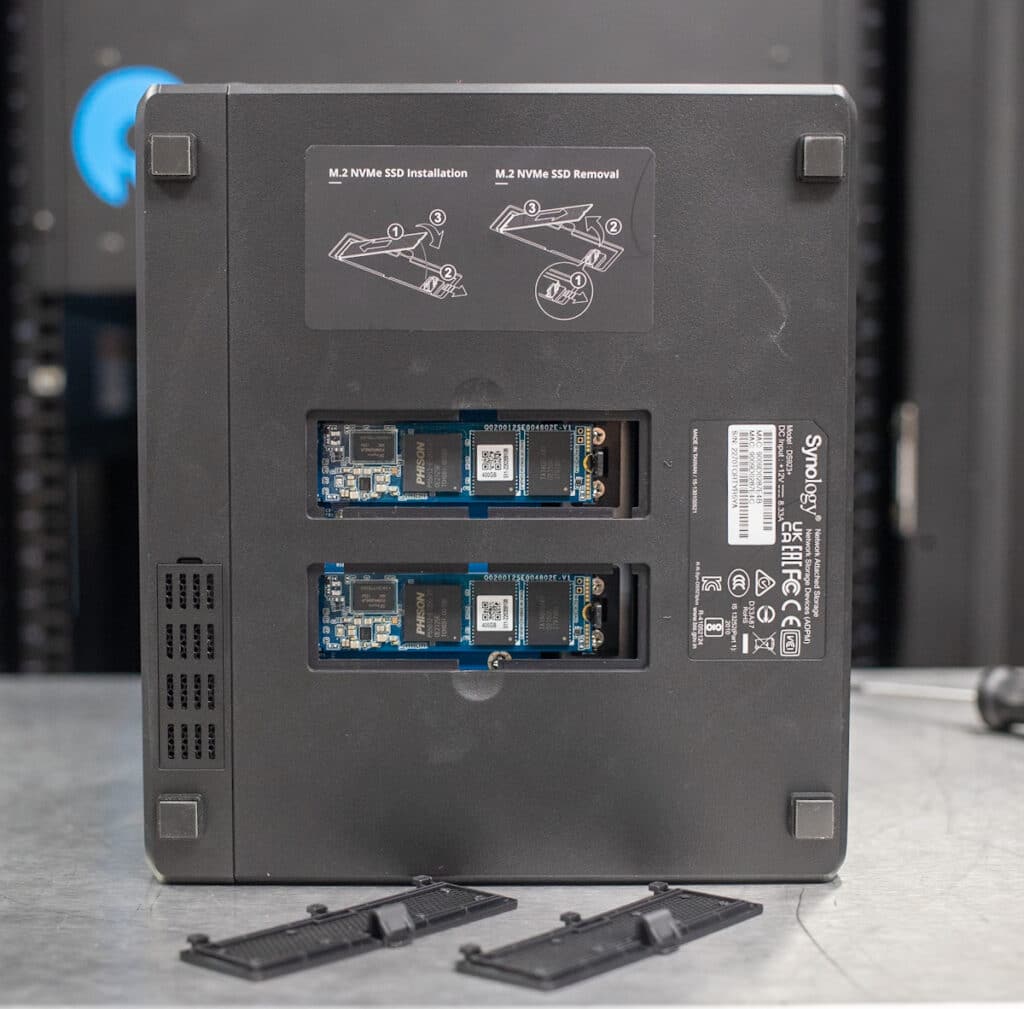
Enterprise Synthetic Workload Analysis
Our enterprise shared storage and hard drive benchmark process preconditions each drive into steady-state with the same workload the device will be tested with under a heavy load of 16 threads with an outstanding queue of 16 per thread, and then tested in set intervals in multiple thread/queue depth profiles to show performance under light and heavy usage. Since NAS solutions reach their rated performance level very quickly, we only graph out the main sections of each test.
Preconditioning and Primary Steady-State Tests:
- Throughput (Read+Write IOPS Aggregate)
- Average Latency (Read+Write Latency Averaged Together)
- Max Latency (Peak Read or Write Latency)
- Latency Standard Deviation (Read+Write Standard Deviation Averaged Together)
Our Enterprise Synthetic Workload Analysis includes four profiles based on real-world tasks. These profiles have been developed to make it easier to compare to our past benchmarks as well as widely-published values such as max 4k read and write speed and 8k 70/30, which is commonly used for enterprise drives.
- 4K
-
- 100% Read or 100% Write
-
- 100% 4K
- 8K 70/30
-
- 70% Read, 30% Write
-
- 100% 8K
- 8K (Sequential)
-
- 100% Read or 100% Write
-
- 100% 8K
- 128K (Sequential)
-
- 100% Read or 100% Write
-
- 100% 128K
First up are the enterprise workloads, where we measured a long sample of random 4K performance with 100% write and 100% read activity. For IOPS, the DS923+ showed 165 IOPS read and 631 IOPS write in SMB and 2,332 IOPS read and 658 IOPS write in iSCSI. With flash, numbers were unsurprisingly much better, posting 6,601 IOPS read and 22,300 IOPS write in SMB, and 102,289 IOPS read and 79,367 IOPS write for iSCSI.
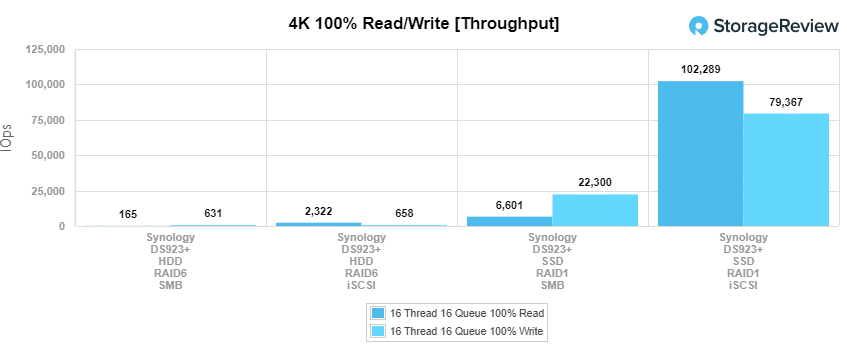
Moving on to 4K average latency, the Synology NAS showed 1,545.85ms read and 404.9ms write in SMB, while iSCSI reached 110.19ms and 388.62ms for reads and writes. With RAID1 flash, the latency expectedly improved, showing 38.78ms read and 11.48ms write in SMB and 2.50ms read and 3.22ms write in iSCSI.
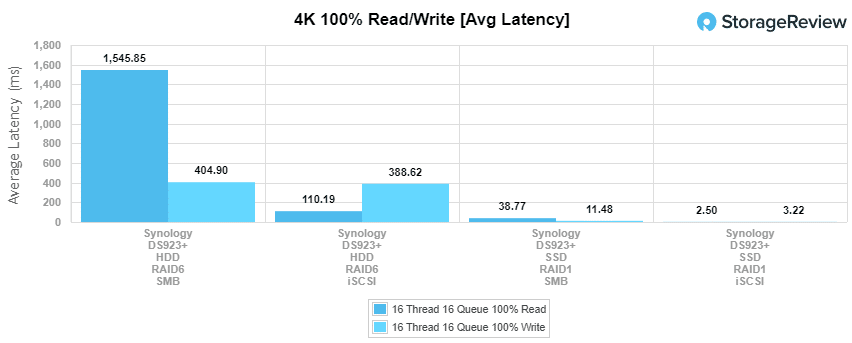
Next up is 4K max latency. Here, we saw the DS923+ with 2,905ms read and 7,492.4ms write in SMB and 5,000.3ms read and 2,500.9ms write in iSCSI. With flash, the NAS boasted 76.037ms read and 107ms write in SMB and 1.45ms read and 6.65ms write in iSCSI.
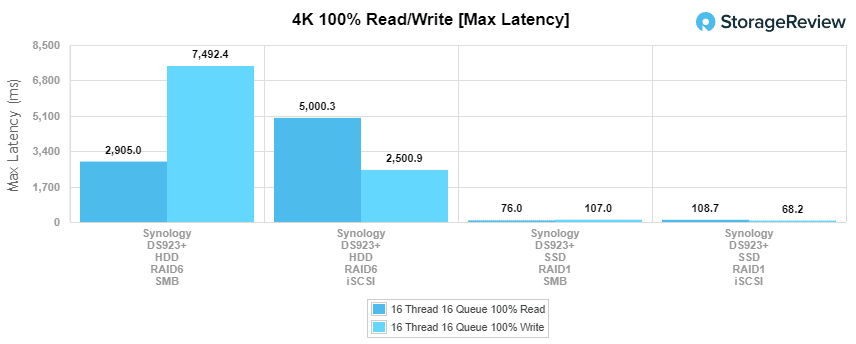
In 4K standard deviation, the DS923+ showed 102.33ms read 590.843ms write in SMB and 132.476ms read and 402.691ms write in iSCSI HDD performance. With flash, latency dropped to 0.846ms read and 4ms write in SMB and 108.693ms read and 68.16ms in iSCSI.
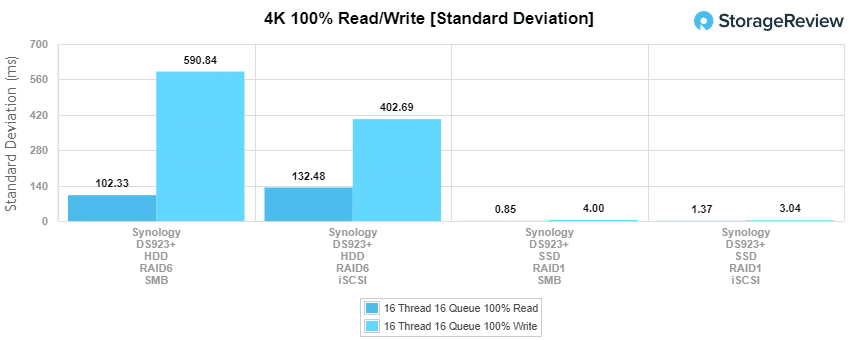
Our next benchmark measures 100% 8K sequential throughput with a 16T16Q load in 100% read and 100% write operations, which showed similar read performance for both HDD-only and cache-enabled configurations. In our HDD setup, the DS923+ hit 32,017 IOPS read and 22,853 IOPS write in SMB and 88,262 IOPS read and 41,317 IOPS write in iSCSI. With RAID1 NVMe SSD, SMB showed 32,149 IOPS read and 26,495 IOPS write, while iSCSI recorded 111,197 IOPS read and 65,137 IOPS write.
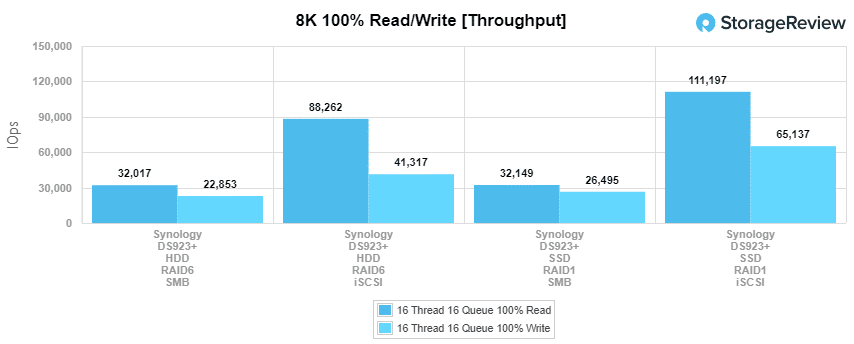
Compared to the fixed 16 thread, 16 queue max workload we performed in the 100% 4K write test, our mixed workload profiles scale the performance across a wide range of thread/queue combinations. In these tests, we span workload intensity from 2 thread/2 queues up to 16 thread/16 queues. In throughput, the HDD configuration posted a range of 215 IOPS to 214 IOPS (SMB) and 449 IOPS to 1,1-4 IOPS (iSCSI), while SSDs showed 7,648 IOPS to 7,633 IOPS (SMB) and 11,515 IOPS to 74,267 IOPS (iSCSI).
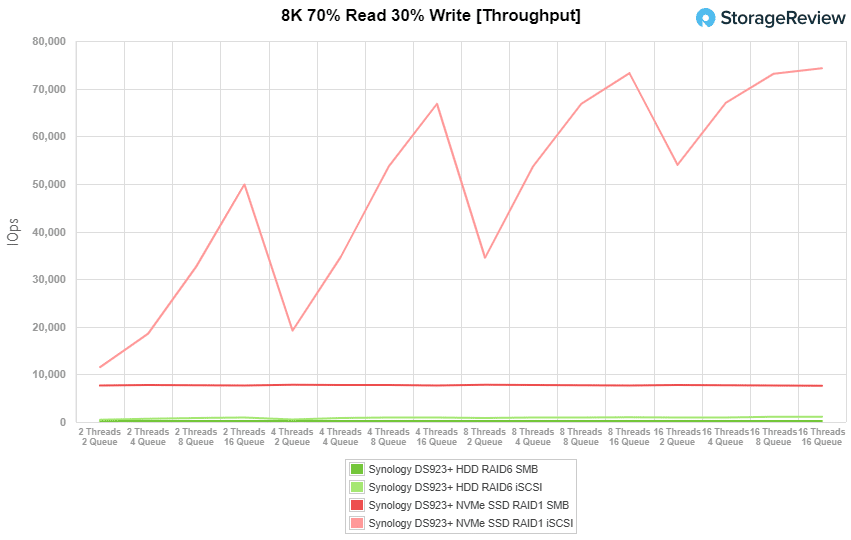
Looking at average latency with our HDD configuration, SMB showed a range of 18.49ms through 1,185ms in the terminal queue depths, while iSCSI recorded 8.85ms to 231.33ms. On the SSDs, SMB ranged from 0.52ms to 33.52ms while iSCSI showed 0.34ms to 3.44ms.
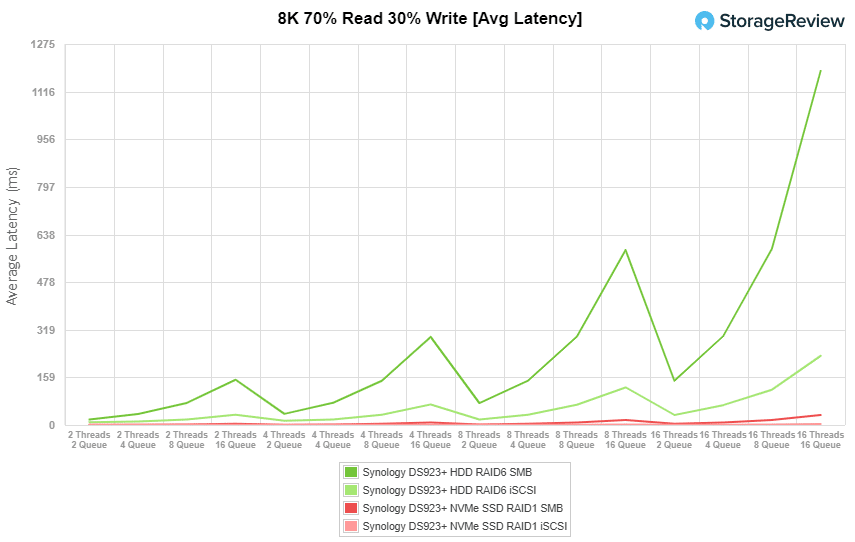
For maximum latency in our HDD configuration, we saw 390ms to 2,601ms in SMB and 400.6ms to 3,263ms in iSCSI. On the SSDs though, the DS923+ posted 18.05ms to 395.5ms and 31.21ms to 117.76ms in SMB and iSCSI, respectively.
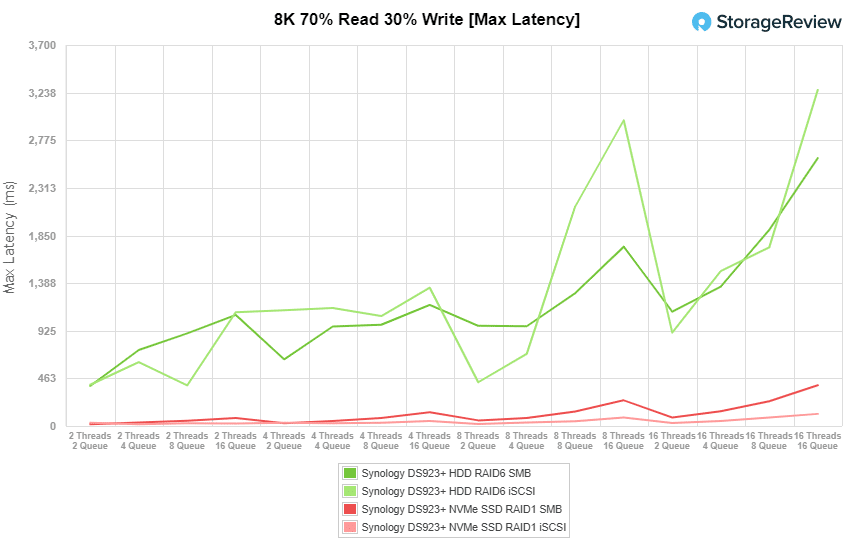
Moving on to standard deviation results, the DS923+ posted 13.4ms to 232.9ms in SMB and 10.93ms to 398.3ms in iSCSI in our HDD configurations. On the M.2 flash, it showed 0.33ms to 12.29ms (SMB) and 0.23ms to 2.34ms (iSCSI).
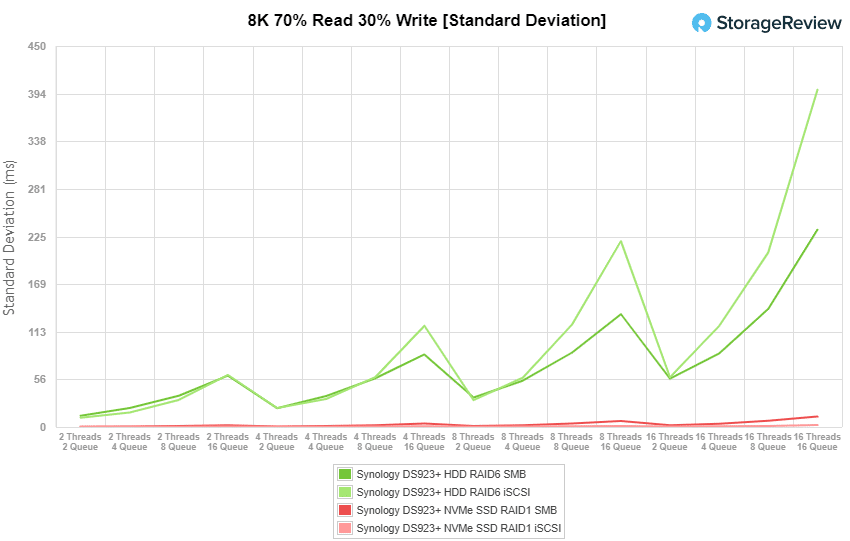
The last synthetic benchmark is our 128K test, which is a large-block sequential test that shows the highest sequential transfer speed for a device. In this workload scenario, we saw virtually identical read performance across the board. Specifically, however, the DS923+ had 1.16GB/s read and 941MB/s write in SMB and 1.15GB/s read and 614MB/s write in iSCSI. On the installed flash, the DS923+ posted 1.16GB/s and 1.06GB/s for writes and reads in SMB, respectively, and 1.16GB/s read and 956MB/s write in iSCSI.
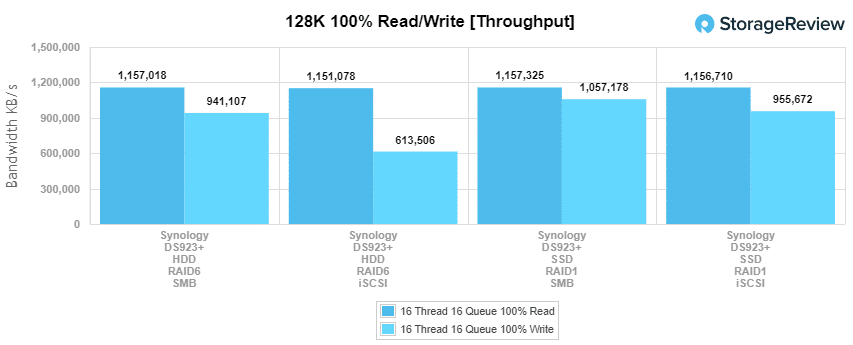
Final Thoughts
The Synology DS923+ is a 4-bay NAS designed primarily for small businesses and other edge deployments. It is equipped with Synology DSM and offers a range of features for data sharing, synchronization, backup, and surveillance. The bonus for this unit is expandability, it supports five more drives with the DX517 expansion unit. The DS923+ also has the option to upgrade to 10GbE networking and add M.2 NVMe SSDs two through the two slots on the bottom.
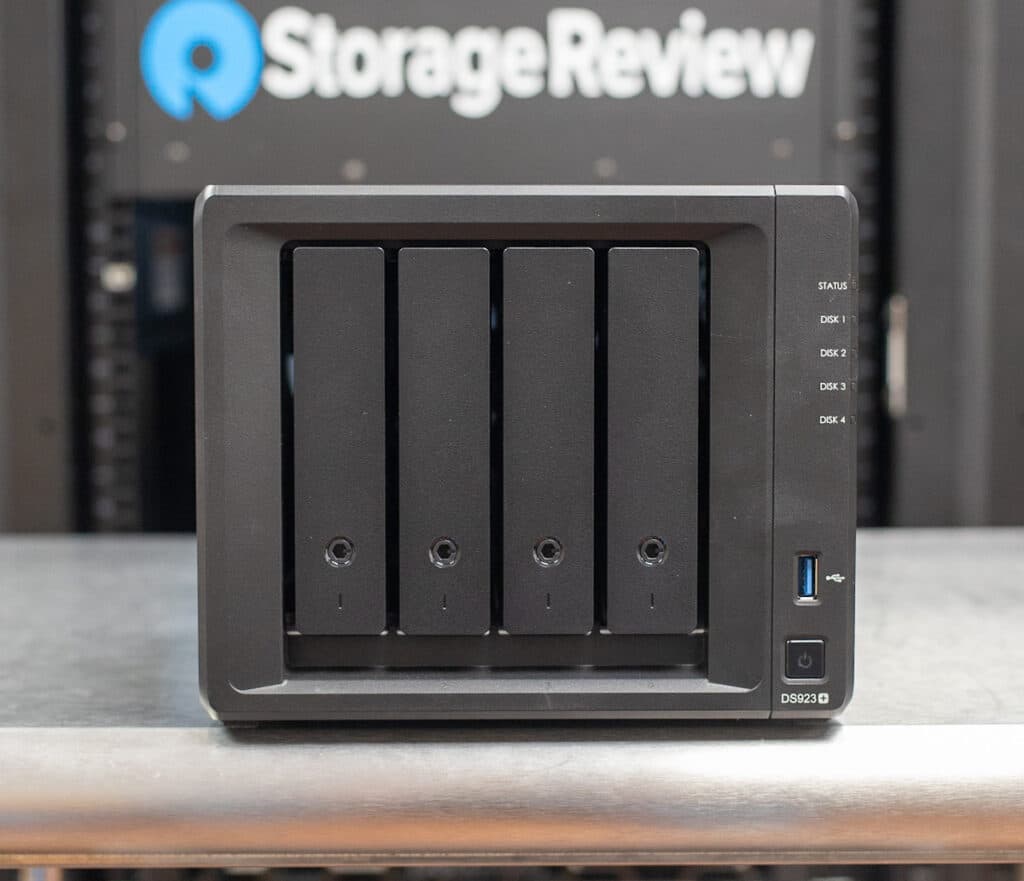
The NVMe SSD slots also can be used for pools in this unit, a first for Synology, prior to the DS923+ these drives could only be used as a cache. This feature however is extremely limited as it only supports Synology NVMe drives, which are capped at 480GB at this time. We love the step forward from Synology here but are very disappointed in the execution. As such, this feature is still very limited at this time.
For performance, we looked at both HDD (four 22TB WD Gold drives configured as RAID6) and SSDs in RAID1 (two Synology 480GB SSDs) configurations using both SMB and iSCSI connectivity. In our 100% read/write random 4K performance test, 165 IOPS read and 631 IOPS write in SMB and 2,332 IOPS read and 658 IOPS write in iSCSI while posting 6,601 IOPS read and 22,300 IOPS write in SMB, and 102,289 IOPS read and 79,367 IOPS write for iSCSI on flash.
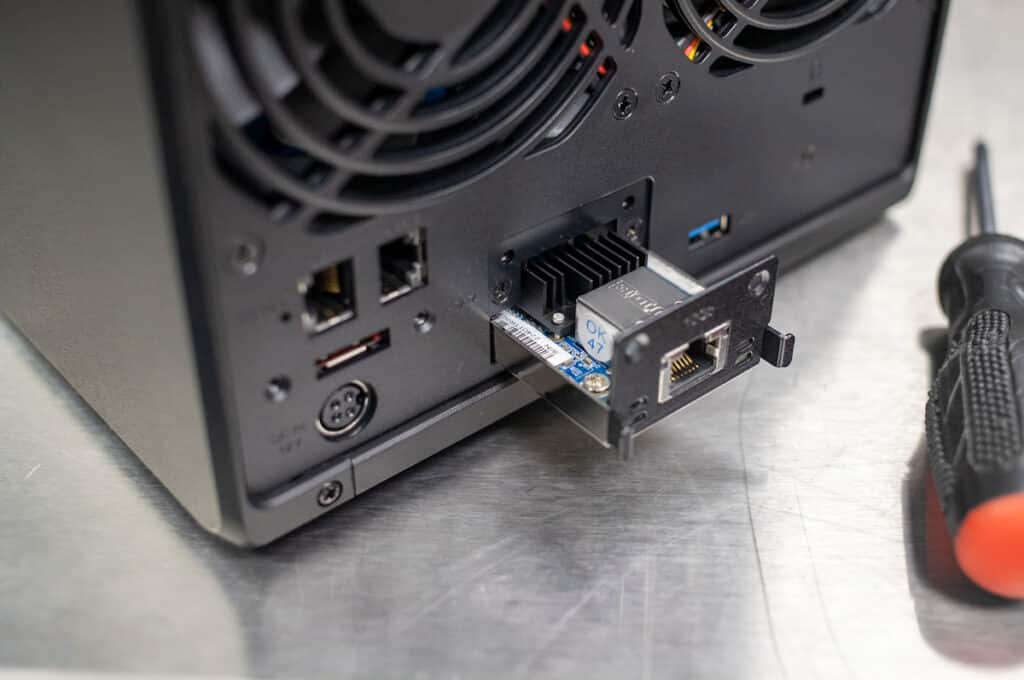
During our 8K sequential throughput tests, the DS923+ reached 32,017 IOPS read and 22,853 IOPS write in SMB and 88,262 IOPS read and 41,317 IOPS write in iSCSI. When we moved to flash, SMB performance showed 32,149 IOPS read and 26,495 IOPS write, while iSCSI recorded 111,197 IOPS read and 65,137 IOPS write.
Lastly, in our large-block sequential test, the DS923+ posted 1.16GB/s read and 941MB/s write in SMB and 1.15GB/s read and 614MB/s write in iSCSI while hitting 1.16GB/s read and 1.06GB/s write for writes, and 1.16GB/s read and 956MB/s write in iSCSI with the SSDs.
The Synology DS923+ is a flexible NAS that offers a range of features for data sharing, synchronization, backup, and surveillance. DSM and the deep application library continue to be the best Synology benefits. They’ve also made progress with this unit to unlock the benefits of flash, but the execution is incomplete. 10GbE should arguably be onboard as well, but to be fair, Synology is balancing price/performance in this unit. Still, the DS923+ is a modest progression and will solve a lot of SMB problems.




 Amazon
Amazon